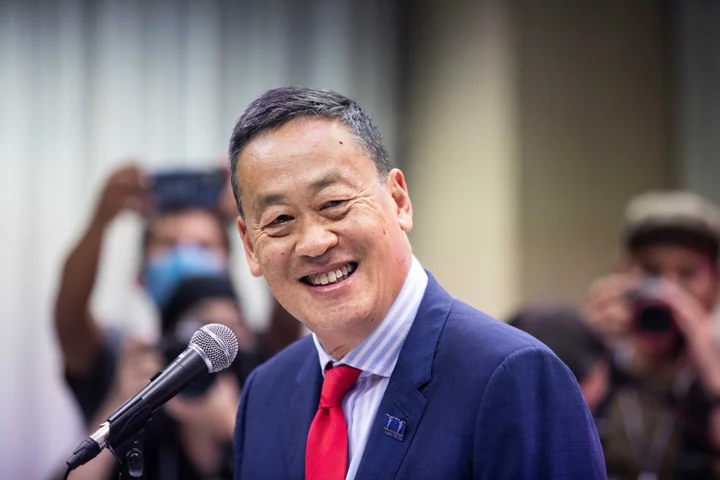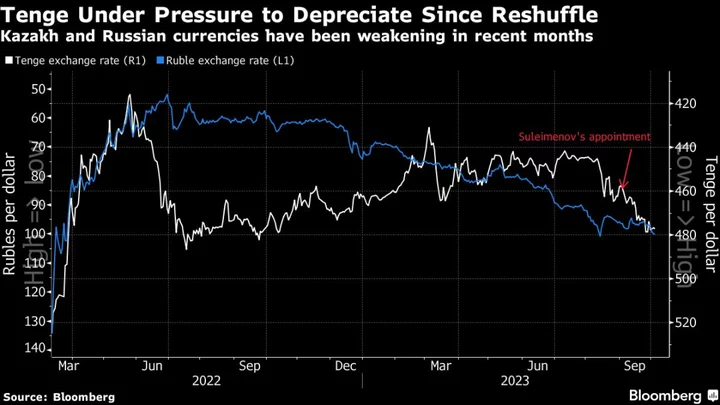Thailand’s Srettha Thavisin may soon find that winning the prime minister’s job was easier than running a coalition government made up of 11 parties previously seen as sworn enemies.
After three months of post-election haggling, Srettha’s coalition — a mix of populist and conservative parties — is likely to be shaky, analysts say, since it was born out of a deal that centered around former Prime Minister Thaksin Shinawatra’s return from 15-years of exile. Thaksin, who was jailed upon arrival over corruption cases but may get a royal pardon, is the de facto head of the Pheu Thai party leading the coalition.
Srettha — a former property tycoon and confidante of Thaksin who leaped from more than 30 years in the private sector to the country’s top political office — seemed to acknowledge the challenge he faces after being formally appointed prime minister.
“You have to wait for the formation to be completed first and let us collectively, as a group, try to move this country forward,” the 61-year-old Srettha said. “Then you can judge whether it’s fragile or not.”
The stability of the incoming government will be a key metric tracked by foreign investors, who have dumped $3.8 billion in Thai stocks this year amid the political uncertainty that followed the May general election. On a positive day for regional stocks, Thailand’s benchmark equity index was up about 0.6% on Thursday, while the baht gained about 0.4%.
In a ceremony Wednesday, Srettha vowed to bring change to Thailand at what he called a “critical juncture” for the nation, saying his government’s policies will foster economic development and usher in changes at the macro as well as household levels.
Srettha’s success or failure could depend on the final makeup of his ruling cabinet, which will help guide Thailand’s $500 billion economy, the second-largest in Southeast Asia. That process is expected to be finalized in the coming days or weeks, with the new government in place in September.
Thaksin’s return on Tuesday, which came just hours before Srettha won his majority in parliament, was made possible after the Pheu Thai party abandoned a previous alliance with the Move Forward party, the top vote-getter in the election.
2014 Coup
Pheu Thai’s move to align with conservative parties it had previously vowed not to work with effectively allowed the military-backed establishment that spent years undermining election wins by Thaksin and, later, his sister, to stay in power.
Nearly 10 years after a coup paused democracy in Thailand, Srettha also faces doubts over whether he may be too inexperienced to navigate the nation’s complicated political landscape, which includes the royal family, a politically-active military and the mass of pro-democracy supporters who turned out for Move Forward and are angry at being out-maneuvered for the prime minister’s post.
“Srettha will likely be a fairly weak premier — a puppet serving both Thaksin and key establishment figures,” said Peter Mumford, Southeast Asia practice head at the Eurasia Group. “It seems likely that Srettha’s coalition will collapse before completing a four-year parliamentary term.”
Balance of Power
A rough division of cabinet portfolios hinted at the complex power-sharing arrangement he’s going to balance. According to Pheu Thai, the party is set to install eight ministers, the same number as what’s divided between the three key pro-establishment groups — the Bhumjaithai Party of cannabis champion Anutin Charnvirakul and pro-military parties backed by former junta leaders Prayuth Chan-Ocha and Prawit Wongsuwan.
“It’s clear that the ultimate winner of this deal is the establishment, because of the weight of the military and conservative elements in the coalition,” said Napon Jatusripitak, a visiting fellow at the ISEAS-Yusof Ishak Institute.
Yet while most of the military-appointed Senate’s votes for Srettha came from members known to be aligned with Prayuth, those linked to Prawit largely abstained. That suggests the establishment may also be divided, which could signal an unstable coalition once governing begins.
“If there are stability issues or failure of management, Pheu Thai will be the one that’s held accountable, not the other groups,” Napon said.
Level of Distrust
Questions also remain over whether a coalition with such disjointed party ideologies can really work together. While Pheu Thai said all its partners agreed to implement its campaign pledges, those regarding rewriting the constitution and ending military conscription may become a source of friction.
“There will be a high level of distrust between Pheu Thai and the parties that were in the outgoing military-backed administration, regardless of whatever deals have been done by Thaksin and key generals,” Mumford said.
A dance to outmaneuver each other will set the tone for the incoming governing coalition. A crucial turning point is seen early next year, when the Senate’s power to pick prime ministers will expire under the current constitution, which was written after Prayuth’s coup in 2014 and designed to entrench establishment powers in Thai politics.
“That would be a moment for Thaksin or Pheu Thai to reopen negotiations with the conservatives,” Napon said. Thaksin “may be thinking he’s just hanging in there until he emerges with the upper hand.”









